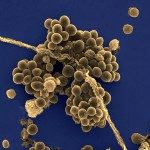Link to Pubmed [PMID] – 8109922
Antimicrob. Agents Chemother. 1993 Dec;37(12):2593-8
An assay based on the utilization of degenerate primers that enable enzymatic amplification of an internal fragment of cat genes known to be present in gram-positive cocci was developed to identify the genes encoding chloramphenicol resistance in streptococci and enterococci. The functionality of this system was illustrated by the detection of cat genes belonging to four different hydridization classes represented by the staphylococcal genes catpC221, catpC194, catpSCS7, and the clostridial gene catP, and by the characterization of a new streptococcal cat gene designated catS. A sequence related to the clostridial catQ gene, which was present in one streptococcal strain, was not detected by this assay. These results reveal that these six cat genes account for chromosomal-borne chloramphenicol resistance in 12 group A, B, and G streptococci tested. By contrast, only three of these six cat genes (catpC221, catpC194, and catpSCS7) were detected on the 10 enterococcal plasmids studied here that encode resistance to chloramphenicol.

